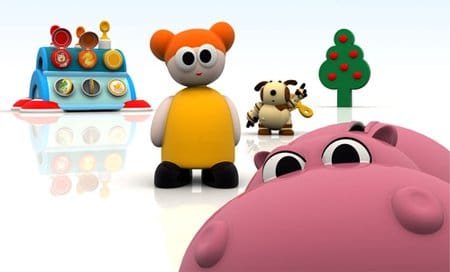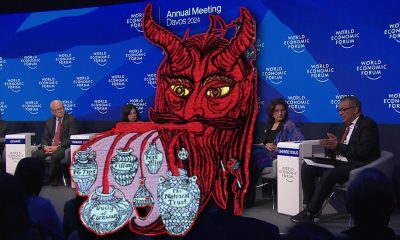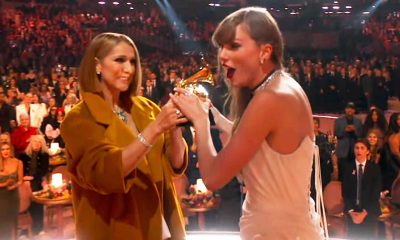Latest News
No TV for Children Under 2, Doctors’ Group Urges

In the past few years, a new kind of specialty TV channel has been inserted in regular programming: TV for toddlers. Networks such as BabyTV air shows that were devised for and aimed to children under two. Most parents who have watched these strange, hypnotic shows are amazed by how their babies are mesmerized by them. But one cannot help but ask: Is it healthy to place a baby, who is barely aware of its surroundings, in front of an 51″ plasma TV with CGI cartoon characters bouncing around in high definition and chanting strange things? Are these shows “educational” or mind-numbing hypnosis sessions scientifically devised to subliminally capture babies’ attention?
No matter what’s the answer, a group of doctors agree that TV is simply not good for babies. If it already makes fully grown adults dumber, one can only imagine what TV does to baby with soft brains who don’t even have the motor functions to stand up straight. Here’s an article summing up a study by the Journal of Pediatrics.
Kids under 2 should play, not watch TV, doctors say
Children under age 2 should avoid watching TV as much as possible, according to a new policy statement from the nation’s largest group of pediatricians, who suggest the tots should play instead.
The idea that TV programs are beneficial to the learning of children this young has not been proved, the American Academy of Pediatrics says. In addition, TV viewing may lead to sleep problems and a delayed use of speech in young kids, recent research suggests.
Even merely having the TV on in the background may be less than optimal for a child’s development, the AAP says. Background television may distract from playtime activities that benefit children’s learning. And it may distract parents, preventing them from speaking and interacting with their kids, the AAP says.
However, the recommendations run counter to what most parents actually do. About 90 percent of parents say their kids younger than 2 watch some type of media, according to a 2007 study. By the age of 3, nearly one-third of kids have a TV in their bedrooms.
As a compromise, parents should come up with a strategy to manage TV viewing in their young children, the AAP says. Ideally, when kids younger than 2 watch TV, their parents should watch it with them.
The new policy statement was released today (Oct. 18) here at the AAP National Conference & Exhibition. The policy statement specifically addresses the viewing of TV programs and does not comment on the potential benefits or risks of using phone applications, video games or other programs a child may encounter on a screen.
Young kids and TV
The AAP first released guidelines on media use by young kids in 1999, concluding that media use by kids under 2 should be discouraged. Since then, a lot more research has been done on the subject. The AAP reviewed this research for its new policy statement and essentially came to the same conclusion.
That’s not to say that kids can’t benefit from TV. Children older than 2 can improve their language and social skills by watching TV, some studies have shown.
However, in order to gain a benefit from a TV program, kids need to be able to understand and pay attention to it. Young kids may lack the mental ability to comprehend what they are watching. In fact, two studies have found that, for kids 2 and under, watching programs such as “Sesame Street” may have a negative impact on language development, the AAP says.
“There’s a great developmental digital divide,” Dr. Ari Brown, a pediatrician in Austin, Texas, and lead author of the new policy statement, said at a news conference. Studies show that children under 11/2 years old have the same reaction to a TV program regardless of whether it’s going forward or backward, Brown said. In contrast, older children prefer to watch the program forward.
All in all, instead of spending time in front of the TV, young kids are likely better off spending that time engaged in unstructured play, which promotes creative thinking, problem solving and reasoning skills.
Setting limits
If parents choose to let their young kids watch TV, they should set limits, the AAP says. They should also avoid placing a TV in the child’s bedroom
Parent should be aware TV programs may affect their child’s development, even if the child cannot understand the program. They should turn the TV off if no one is watching it and try to watch their adult programs when the kids are not around, Brown said.
If parents cannot play with their kids directly, even having the children play with toys by themselves can be beneficial, the AAP says.
The AAP also recommends further research in this area to examine the long-term effects of early TV viewing on toddlers’ development.
The new policy statement will be published in the November issue of the journal Pediatrics.
– MSNBC, Kids under 2 should play, not watch TV, doctors say
- The Dark Side of the Netflix Movie “Burning Betrayal”
- Trans mayor whines about being ‘bullied’ out of office despite rampant crime, homelessness
- Yuval Noah Harari: 'When the Flood Comes' Elite Will 'Build an Ark' and 'Leave the Rest To Drown'
- When Bill Maher gets a little too honest…
- Critical race theory summed up in two sentences: OJ Simpson “k!lled two people in cold blood” “His acquittal for murd3r was the correct and necessary result of a racist criminal legal system”
- Courtney Love – Album Art
- It's Plain to See Who is Actually in Charge of "Anti-Globalist" Hungary…
Get an e-mail notification as soon as a new article is published on The Vigilant Citizen.
-

 Latest News2 months ago
Latest News2 months agoThe Top 6 Most Deranged Moments of the WEF’s 2024 Davos Meeting
-

 Vigilant Reports2 months ago
Vigilant Reports2 months agoSuper Bowl 2024 Was a Circus Involving a Clown Wearing an Inverted Cross
-

 Movies and TV2 months ago
Movies and TV2 months ago2024 Grammys: It Had To Be All About Taylor Swift. It Just Had To.
-

 Pics of the Month3 months ago
Pics of the Month3 months agoSymbolic Pics of the Month 01/24
-

 Pics of the Month2 months ago
Pics of the Month2 months agoSymbolic Pics of the Month 02/24
-

 Movies and TV1 month ago
Movies and TV1 month agoThere’s Something Terribly Wrong With “Poor Things”
-

 Music Business3 weeks ago
Music Business3 weeks agoThe Blatant Luciferian Symbolism in Justin Timberlake’s “No Angels”
-

 Music Business1 month ago
Music Business1 month agoPoppy’s “V.A.N”: One of the Most Blatant MKULTRA Videos Ever Made


















